CONTACTAbout UsCAREER OPPORTUNITIESADVERTISE WITH USPRIVACY POLICYPRIVACY PREFERENCESTERMS OF USELEGAL NOTICE
© 2025 Equal Entertainment LLC.
All Rights reserved
All Rights reserved
By continuing to use our site, you agree to our Privacy Policy and Terms of Use.
We need your help
Your support makes The Advocate's original LGBTQ+ reporting possible. Become a member today to help us continue this work.
Your support makes The Advocate's original LGBTQ+ reporting possible. Become a member today to help us continue this work.
Last year University of Southern California graduate student Mitsuyo Miyazaki embarked on a journey back to Japan to mark the 10th anniversary of her grandmother's death. As the family gathered, a stack of long-lost photos turned up, showing her grandmother, Tsuyako, with an unknown woman. After looking a little closer, Miyazaki knew that her grandmother once loved this woman.
"Her gaze and gesture spoke of something that transcended friendship," Miyazaki said. "She couldn't touch who she wanted to touch; she couldn't kiss who she really wanted to kiss."
Tsuyako eventually married a man, but Miyazaki remembers her grandmother's bitterness about the marriage. With talk of how she never wanted to marry her husband, Tsuyako constantly threatened to leave her family behind.
"Had she not made that sacrifice, I would not be here," Miyazaki said.
To honor her grandmother, Miyazki and classmate Michelle Peerali are making the trek to Japan to capture Tsuyako's story, which takes place in the aftermath of World War II, in an eponymous feature film. The pair, both in their last year at USC, talk about taking on this major project.
The Advocate: This project is your graduate thesis film, the final project you will submit before graduation. To add more to your plate, you've opted to retain the rights to this film, but you have no financial support from USC. What has that been like for you?
Mitsuyo Miyazaki: We chose this path because this is something we will be doing in the professional world and this will be a great opportunity to get our hands dirty.
Michelle Peerali: It's pretty much along the lines of independent filmmaking -- working from the ground up. We basically have to raise everything when it comes to crewing, equipment, and location.
Mitsuyo, you're the director of this film, while Michelle, you serve as a producer. How did you two meet?
Peerali: The first day of class we realized we were with the same agency in Los Angeles. We bonded because were going to auditions while going to film school. I just instantly bonded with Mitsuyo because of her personality and because of how passionate and creative she is as a human being. She's very comfortable to be around. As a producer, who wouldn't want to be around that sort of person?
What was your grandmother Tsuyako like?
Miyazaki: My grandmother was someone who never wore a skirt. She always wore jeans, a polo shirt, a frumpy hat, and huge glasses with a chain wallet hanging from her side while smoking cigarettes. She would be 90 years old if she was alive. My grandfather used to do a lot of photography, and in none of the photos she smiled. She was this tough cookie that was bitter about life and sometimes talked about how she didn't want to marry my grandfather and was always ready to run away from the family.
How did you discover her secret life before your grandfather?
Miyazaki: We loved my grandmother so dearly and we never really wanted to go through her belongings. Years later we decided to, and my mother found a box of photos that none of us saw before. Seeing that picture, it just dawned on me. When I saw this girl she was with, she looked so feminine, she was simply so happy. For the first time I saw a female side of her my grandmother, and that's how I came up with the story.
What story line will the film feature?
Miyazaki: My great-grandmother is the antagonist of the film. I just imagine if [Tsuyako] had the freedom to escape with this girl. She stayed because that was the culture of the family and she had no choice. I wanted to give her freedom in this film, if only for a moment. At the end of the movie she says, "I'm not going." But that's the reality of it. If she was gone, I would not be here.
You've decided to film in Osaka, Japan, and use Japanese actors. Why not film in Los Angeles to save money?
Peerali: People were questioning, why not shoot it in Alhambra and get some cheap interiors and try to get some exteriors and stock footage of Japan? Given what's going on with Proposition 8, we don't have equal rights to marry yet, but in Japan where it's so repressed with sexuality and sexual progression, it would be really beautiful to bring the freedom we have here and liberate this story in a country that's still kind of not OK with it.
Mitsuyo, you also work as a cinematographer and photographer -- are there visual elements in Japan you wanted to capture in this film?
Miyazaki: We're trying to shoot on film, and everything from the sunrise to the color of the sun to the air, the green, everything is so different. That's where I grew up. As an artist that's important for me, to shoot a film where it belongs. My story is set in the Osaka area, and we have a very thick accent. I also want to find actors who live there, who know where we live and our personalities. I don't want to choose the actors until I get to Japan.
Do you have any actors in mind?
Miyazaki: One of the actors, he's a male, he's the character of Kinya, which is Tsuyako's husband -- he's a celebrity and very interested in portraying this character.
How are you raising funds for this project?
Peerali: We're having fund-raisers. A couple of friends throw nights in Los Angeles that are GLBT-friendly or centered on the lesbian scene. They're trying to bring awareness by having a night at their club for a couple hours where people can donate money. We're reaching out to LGBT organizations, Asian LGBT organizations in L.A. or all over the world that might be able to spread the word. We're also applying for grants.
Miyazaki: People can visit our website for a description of what we're trying to do. We take it seriously; it's what we've learned at USC in the past three years. If people donate $10 and there are 1,000 of them, then we have $10,000.
You are also blogging about the experience in order to show what it's like to make a film from the ground up.
Peerali: We've been blogging and putting up videos about the process of what it takes to make a film and what we've been through.
Miyazaki: We also have this beautiful production bible that talks about our stories and my ideas for scripts. It took us three months to complete, and we're sending it to people who might be interested.
Have you received donations so far?
Miyazaki: We've been going around town in Burbank, mostly, and we got everything donated by local businesses for our bible. We've been very fortunate and have decided to make it a bit more artistic. Our presentation package is not just a print, staple, and go. It's handmade, original work.
What was your childhood like?
Miyazaki: I started singing when I was 11 years old. All my teenage life I did that and I acted and danced. In undergrad I studied fine arts, dance, and music. This film is the ultimate conclusion of everything I did in my past. We've been working very hard to find the right editors, the right sound designers, people who understand where I come from, my visual style.
Is the film going to be in English or Japanese?
Miyazaki: The film will be in Japanese. The festivals we're trying to submit the film to are obviously not going to be Japanese-speaking, but with a lot of Japanese films now, they hardly ever make films with an Osaka accent. Osaka is the second capital of Japan, and we have a very long traditional theater culture not many people know about. As an artist from Osaka I wanted to keep true to the story.
You mentioned Proposition 8 earlier -- can you elaborate on your feelings about marriage equality?
Miyazaki: As human beings, we should all have equal rights. I thought California would be the place to set a standard of equality, but it's really frustrating to see how things have turned out in the end. I'm bisexual, so anything I can do to support, I try to be there.
Peerali: Whether it is the confines of religion or tradition and culture, those are things that restrict love. I've noticed those things have to do with somebody else's idea of how you should be, and that's why a young adult or teenager dealing with sexuality issues is affected. It's hard enough to be a minority, let alone have such infrastructures as the church and state or your family imposing on you feeling true to yourself. In this film it's specifically a certain culture, a time in history -- we wanted to show there was a moment where a person could feel truest to themselves despite all that.
What kind of experience is Tsuyako going to give audiences?
Peerali: It's going to be a sensory experience.
Miyazaki: The structure of where everyone is working is dark, everyone is sweating, and the sound of the machinery is actually going to be a big part of our film. It shows what Tsuyako is feeling as the air compressor spits out air.
What is Tsuyako's message?
Peerali: It's hard enough to find true love. Why repress it if it's going to be with a man, woman, transsexual, or whoever you fancy? If you find that with someone, embrace it.
Miyazaki: This is a love story, and the themes apply to everyone. One of the girls could be a guy and that could be a beautiful love story as well. My film has no boundaries.
From our Sponsors
Most Popular
Bizarre Epstein files reference to Trump, Putin, and oral sex with ‘Bubba’ draws scrutiny in Congress
November 14 2025 4:08 PM
True
Jeffrey Epstein’s brother says the ‘Bubba’ mentioned in Trump oral sex email is not Bill Clinton
November 16 2025 9:15 AM
True
Watch Now: Pride Today
Latest Stories
A heart filled with trans hate is how Marjorie Taylor Greene is choosing to be remembered
December 20 2025 10:00 AM
Trump's FDA sends warning letters to companies selling chest binders
December 19 2025 2:31 PM
Bowen Yang to leave SNL after Ariana Grande and Cher episode
December 19 2025 2:10 PM
Notorious anti-LGBTQ+ New York Archbishop Dolan retires — here are his worst moments
December 19 2025 1:27 PM
Sarah McBride knew some Democrats would betray trans people, so she lobbied Republicans
December 19 2025 12:55 PM
Creating Change Returns to Washington D.C. for 38th Convening for LGBTQ Advocacy
December 19 2025 12:22 PM
House passes bill banning Medicaid from covering gender-affirming care for youth
December 19 2025 11:05 AM
Health policy expert to RFK Jr.: You can't ban trans youth care this way
December 18 2025 5:37 PM
12 lesbian thrillers and mysteries to binge & where to watch them
December 18 2025 4:36 PM
Netflix's 'Boots' season 2 plot revealed by producer amid cancelation
December 18 2025 4:33 PM
Charlie Kirk's accused killer, Tyler Robinson, on LGBTQ+ issues: It's complicated
December 18 2025 4:04 PM

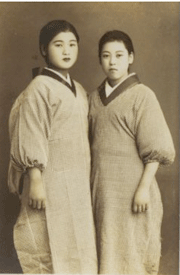
































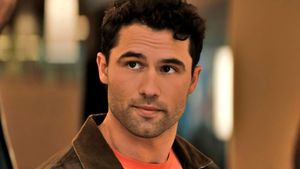













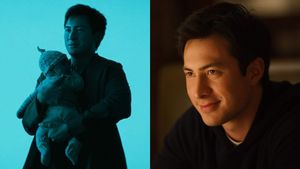
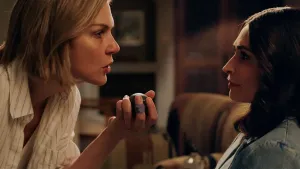




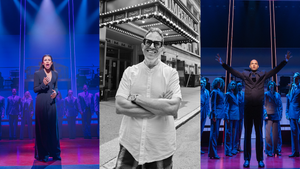






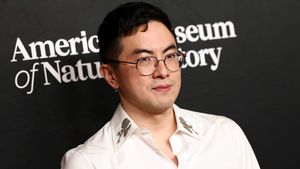






Charlie Kirk DID say stoning gay people was the 'perfect law' — and these other heinous quotes